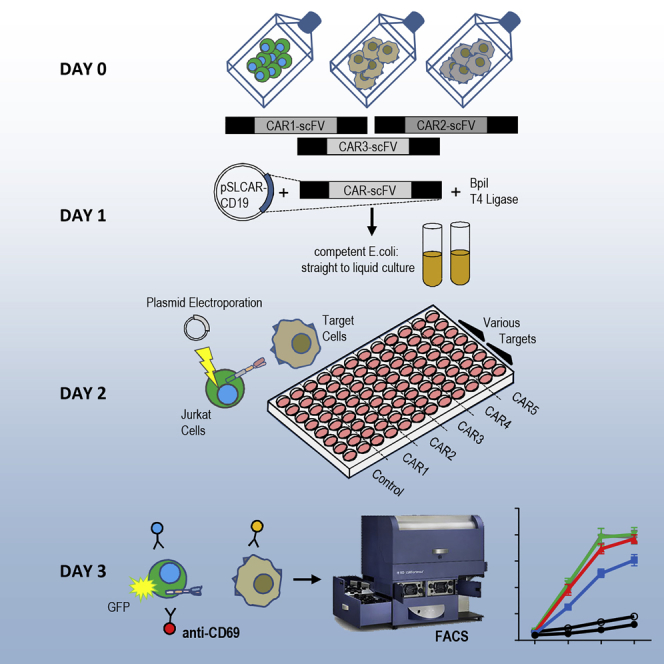- Record: found
- Abstract: found
- Article: found
A High-Throughput Method for Characterizing Novel Chimeric Antigen Receptors in Jurkat Cells

Read this article at
Abstract
Chimeric antigen receptor (CAR) development involves extensive empirical characterization of antigen-binding domain (ABD)/CAR constructs for clinical suitability. Here, we present a cost-efficient and rapid method for evaluating CARs in human Jurkat T cells. Using a modular CAR plasmid, a highly efficient ABD cloning strategy, plasmid electroporation, short-term co-culture, and flow-cytometric detection of CD69, this assay (referred to as CAR-J) evaluates sensitivity and specificity for ABDs. Assessing 16 novel anti-CD22 single-chain variable fragments derived from mouse monoclonal antibodies, CAR-J stratified constructs by response magnitude to CD22-expressing target cells. We also characterized 5 novel anti-EGFRvIII CARs for preclinical development, identifying candidates with varying tonic and target-specific activation characteristics. When evaluated in primary human T cells, tonic/auto-activating (without target cells) EGFRvIII-CARs induced target-independent proliferation, differentiation toward an effector phenotype, elevated activity against EGFRvIII-negative cells, and progressive loss of target-specific response upon in vitro re-challenge. These EGFRvIII CAR-T cells also showed anti-tumor activity in xenografted mice. In summary, CAR-J represents a straightforward method for high-throughput assessment of CAR constructs as genuine cell-associated antigen receptors that is particularly useful for generating large specificity datasets as well as potential downstream CAR optimization.
Graphical Abstract
Related collections
Most cited references29
- Record: found
- Abstract: found
- Article: not found
Distinct Signaling of Coreceptors Regulates Specific Metabolism Pathways and Impacts Memory Development in CAR T Cells.
- Record: found
- Abstract: found
- Article: not found
A novel chimeric antigen receptor containing a JAK-STAT signaling domain mediates superior antitumor effects

- Record: found
- Abstract: found
- Article: found
